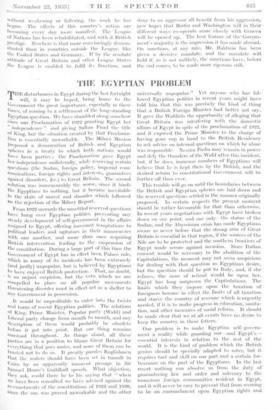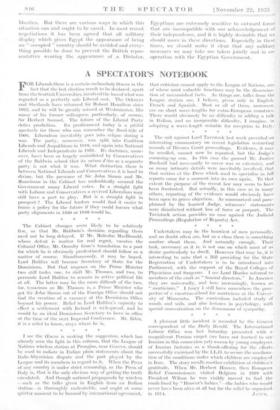THE EGYPTIAN PROBLEM
:THE disturbances in Egypt during the last fortnight will, it may be hoped„ bring home to the Government the great importance, especially in these times, of coming to a settlement of the long-standing Y■gsYptian question. We have stumbled along somehow Since our Proclamation of 1922 granting Egypt her Independence," and giving Sultan Fuad the title Of King, but the situation created by that Proclama- tion , is essentially unworkable. The Milner Mission proposed a demarcation of British and Egyptian spheres in a treaty to which both nations would have been parties ; the Proclamation gave Egypt her independence unilaterally, while reserving certain questions (the Sudan, foreign policy, imperial com- Munications, foreign rights and interests, guarantees against disorders, &c.) to Great Britain. The second elution was irnnreasurably the worse, since it binds the Egyptians to nothing, but it became inevitable • in the state of unrest and disorder .which followed '0I1 the rejection of the Milner Report.
From 1922 onwards the unsettled reserved questions have, hung over Egyptian polities, preventing any 4eady. development of self-government in the affairs assigned to Egypt, offering incessant temptations to Political leaders and agitators in their manoeuvres
:'With one another, and more than once requiring tritish intervention leading to the suspension of the constitution. During a large part of this time the Government of Egypt has in effect been Palace rule, .),Yhich in many of its incidents has been extremely (and justly) unpopular, but is believed by Egyptians to have enjoyed British protection. That, no doubt, is an unjust suspicion, but the veto which we are compelled to place on all popular movements .threatening disorder must in :effect, act as a shelter to 1137 Government in possession, It would be unprofitable to enter into the twists and turns of recent Egyptian politics. The relations of Ring, Prime Minister, Popular party (Wafd) and Liberal; party change from month to month, and any description of them would probably be , obsolete before. it got into print. But one thing remains Constant throughout. As things stand, all these Parties are in a position to blame Great Britain for everything that goes amiss; and none of them can be trusted not to do so. It greatly.. puzzles Englishmen that the waters should have been set in tumult in Cairo by. an • apparently innocent passage in .Sir Samuel. Hoare's ,Guildhall speech... What objection, they :ask, could there be to his saying that " when 1•17. have .been consulted we have advised against the Re-enactments of the ,constitutions of 1928 and 19M bhIN the one ;was proved unworkable . and the ,other universally unpopular." Yet anyone who has fol- lowed Egyptian politics in recent years might have told him that this was precisely the kind of thing that ,a British Foreign Minister had better not. say. It gave the Wafdists the opportunity, of alleging that Great Britain was interfering with the domestic affairs of Egypt in spite of the proclamation of 1922, and it exposed the Prime Minister to the charge of having gone cap in hand to the British Residency to ask advice on internal questions on which he alone was responsible. Nessim Pasha may remain in power and defy the thunders of the Wafd after this incident, but, if he: does, immense numbers of Egyptians will believe that he is kept there by the British, and the desired return to constitutional Government will be further off than ever.
This trouble will go on until the boundaries between the British and Egyptian spheres are laid down and the reserved questions settled in the manner originally proposed. In certain respects the present moment should be rather favourable for that than .otherwise. In recent years. negotiations with Egypt have broken down on one point, and one only—the status of the Sudan, and the Abyssinian crisis has made Egyptians aware as never before that the strong arm of Great Britain is essential in that region, if the sources of the Nile are to be protected and the southern frontiers of Egypt made secure against invasion. Since Italian consent would be necessary to the abolition of the Capitulations, the moment may not, seem auspicious for dealing with that question as Egyptians desire, but the question should be put to Italy, and, if she refuses, the onus of refusal would be Upon her. Egypt has long outgrown the Capitulations. The limits which they impose upon the taxation of foreigners become in effect the limits of all taxation and starve the country of revenue which is urgently Deeded, if it is to make progress in education, sanita- tion, and other measures of social reform. It should be made clear that we at all events have no desire_ to keep the country. in these fetters.
Our problem is ,to make Egyptian self- govern- ment a reality while, guarding our—and EgypVs� essential interests in relation. to the rest of the world. It is the kind of problem which the British genius should be specially adapted to solve, but it requires tact and skill on our part and a certain for- bearance on the part of the Egyptians. In the last resort nothing can .absolve us from the duty of guaranteeing ..law and order and solvency to the numerous ;foreign communities resident in Egypt, and it will,never be easy to prevent that from seeming to be an .encroachment upon .Egyptiare rights and liberties. But there are various ways in which this situation can and ought ta.be cased. Itnmost recent negotiations it has been agreed that all military display which gives Egypt the appearance of being ail " occupied " country should be avoided and every- thing possible be done to prevent the British repre- sentative wearing the appearance of a Dictator. Egyptians are extremely sensitive to outward forms that ,are incompatible with our acknowledgement of their independence, and it is highly desirable that we should move in these directions. Especially in these times, we should make it clear that any military, measures we may take are taken jointly and in co.! operation with the Egyptian Government.































































































 Previous page
Previous page